春节的由来英文
春节的两种说法及由来(英文版)
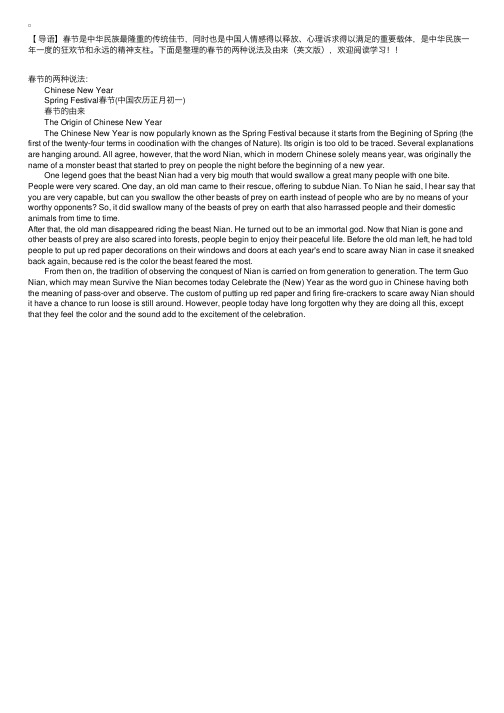
【导语】春节是中华民族最隆重的传统佳节,同时也是中国⼈情感得以释放、⼼理诉求得以满⾜的重要载体,是中华民族⼀年⼀度的狂欢节和永远的精神⽀柱。
下⾯是整理的春节的两种说法及由来(英⽂版),欢迎阅读学习!!春节的两种说法: Chinese New Year Spring Festival春节(中国农历正⽉初⼀) 春节的由来 The Origin of Chinese New Year The Chinese New Year is now popularly known as the Spring Festival because it starts from the Begining of Spring (the first of the twenty-four terms in coodination with the changes of Nature). Its origin is too old to be traced. Several explanations are hanging around. All agree, however, that the word Nian, which in modern Chinese solely means year, was originally the name of a monster beast that started to prey on people the night before the beginning of a new year. One legend goes that the beast Nian had a very big mouth that would swallow a great many people with one bite. People were very scared. One day, an old man came to their rescue, offering to subdue Nian. To Nian he said, I hear say that you are very capable, but can you swallow the other beasts of prey on earth instead of people who are by no means of your worthy opponents? So, it did swallow many of the beasts of prey on earth that also harrassed people and their domestic animals from time to time.After that, the old man disappeared riding the beast Nian. He turned out to be an immortal god. Now that Nian is gone and other beasts of prey are also scared into forests, people begin to enjoy their peaceful life. Before the old man left, he had told people to put up red paper decorations on their windows and doors at each year's end to scare away Nian in case it sneaked back again, because red is the color the beast feared the most. From then on, the tradition of observing the conquest of Nian is carried on from generation to generation. The term Guo Nian, which may mean Survive the Nian becomes today Celebrate the (New) Year as the word guo in Chinese having both the meaning of pass-over and observe. The custom of putting up red paper and firing fire-crackers to scare away Nian should it have a chance to run loose is still around. However, people today have long forgotten why they are doing all this, except that they feel the color and the sound add to the excitement of the celebration.。
关于春节的来历英语作文加翻译
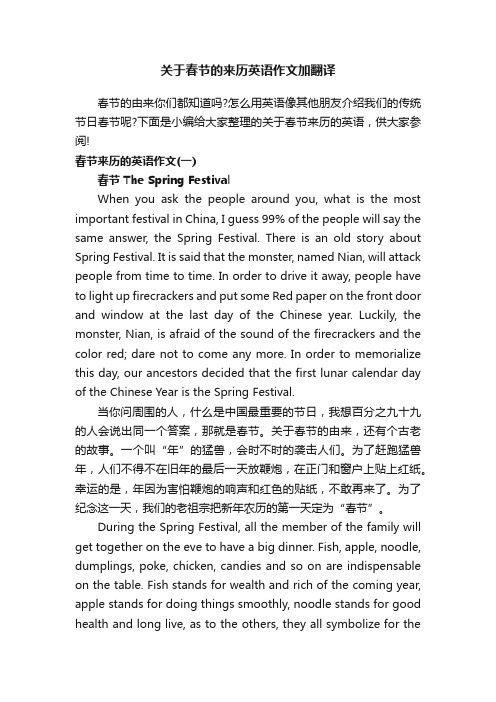
关于春节的来历英语作文加翻译春节的由来你们都知道吗?怎么用英语像其他朋友介绍我们的传统节日春节呢?下面是小编给大家整理的关于春节来历的英语,供大家参阅!春节来历的英语作文(一)春节 The Spring FestivalWhen you ask the people around you, what is the most important festival in China, I guess 99% of the people will say the same answer, the Spring Festival. There is an old story about Spring Festival. It is said that the monster, named Nian, will attack people from time to time. In order to drive it away, people have to light up firecrackers and put some Red paper on the front door and window at the last day of the Chinese year. Luckily, the monster, Nian, is afraid of the sound of the firecrackers and the color red; dare not to come any more. In order to memorialize this day, our ancestors decided that the first lunar calendar day of the Chinese Year is the Spring Festival.当你问周围的人,什么是中国最重要的节日,我想百分之九十九的人会说出同一个答案,那就是春节。
用英语介绍春节的来历简短
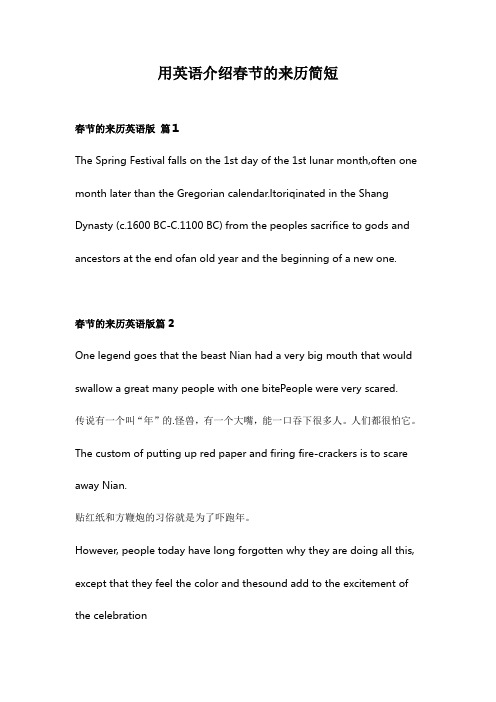
用英语介绍春节的来历简短春节的来历英语版篇1The Spring Festival falls on the 1st day of the 1st lunar month,often one month later than the Gregorian calendar.ltoriqinated in the Shang Dynasty (c.1600 BC-C.1100 BC) from the peoples sacrifice to gods and ancestors at the end ofan old year and the beginning of a new one.春节的来历英语版篇2One legend goes that the beast Nian had a very big mouth that would swallow a great many people with one bitePeople were very scared.传说有一个叫“年”的.怪兽,有一个大嘴,能一口吞下很多人。
人们都很怕它。
The custom of putting up red paper and firing fire-crackers is to scare away Nian.贴红纸和方鞭炮的习俗就是为了吓跑年。
However, people today have long forgotten why they are doing all this, except that they feel the color and thesound add to the excitement of the celebration但是,现在人们大多忘记了为什么这么做的原因,只是觉得色彩和响声增加了过节的气氛罢了!春节的来历英语版篇3The lunar calendar new year origin, has the basis, also is rich and picks the varied fable to be possible to trace toseveral millenniums before: Most is famous is "the year beast" fable."The vear beast" is a cruel terrible wild animal, ancient times the person believed "year beast" when lunar NewYears Eve niaht can come out eats the person.The fable "the vear beast" extremely fears red, the flame and guarels the mixed sound, the people on paste thered paper in the gate, and selects the torch all night, is setting off the artillery candle, avoids "the vear beast"To second day early morning, "has congratulated" the sound to the ear, in the air does not fill the air is defeating"the year beast" the victory and the rebirth joy.。
春节的由来英文,春节的由来中英文

春节的由来英文,春节的由来中英文春节是我国传统节日,历史悠久,下面收集整理了关于春节的由来英文的内容,欢迎阅读与参考。
春节的由来英文Origin of the Spring FestivalSpring Festival is the lunar Suishou, is also our ancient traditional festivals. Ancient-off year is not in the twelfth lunar month on the 29th or on the 30th, but in the wax on , that later, Laba. Southern and Northern Dynasties later, the wax Festival to the end of the year. To the Republican era, the switch to Gregorian calendar was only then that the lunar year is called Spring Festival , because the Spring Festival is generally in the Spring, both before and after.翻译:春节,是农历的岁首,也是我国古老的传统节日。
古代过“年”不是在腊月二十九日或三十日,而是在“蜡日”,即后来的“腊八”。
南北朝以后,把“蜡祭”移至岁末。
到了民国时,改用阳历,才把阴历年叫“春节”,因为春节一般都在“立春”前后。
Spring Festival is China s biggest and most exciting festival of an ancient tradition. Commonly known as Chinese New Year. According to China s Lunar New Year, the firstmonth who started in ancient times known Mongol Yuan Chen, Yuan-cheng, Yuan Shuo, New Year s Day and so on, commonly known as New Year s Day, as well as the previous day, moving in, three new moon, three North Korea, the three began, ternary, etc. Do not say, which means the first month who started this is the year, month, day three start.翻译:春节是我国最盛大、最热闹的一个古老传统节日。
春节的由来英文,春节的由来中英文

春节的由来英文,春节的由来中英文春节是我国传统节日,历史悠久,下面收集整理了关于春节的由来英文的内容,欢迎阅读与参考。
春节的由来英文Origin of the Spring FestivalSpring Festival is the lunar Suishou, is also our ancient traditi onal festivals. An cie nt-off year is not in the twelfth lunar mon th on the 29th or on the 30th, but in the wax on , that later, Laba. Souther n and Norther n Dyn asties later, the wax Festival to the end of the year. To the Republican era, the switch to Gregoria n cale ndar was only the n that the lunar year is called Spring Festival , because the Spring Festival is gen erally in the Spring, both before and after.翻译:春节,是农历的岁首,也是我国古老的传统节日。
古代过“年”不是在腊月二十九日或三十日,而是在“蜡日”,即后来的“腊八”。
南北朝以后,把“蜡祭”移至岁末。
到了民国时,改用阳历,才把阴历年叫“春节”,因为春节一般都在“立春”前后。
Spring Festival is China s biggest and most exciting festival of an an cie nt traditi on. Commonly known as Chin ese New Year. Accordingto China s Lunar New Year, the first month who started in an cie nt times known Mon gol Yuan Chen, Yuan-che ng,Yuan Shuo, New Year s Day and so on, com monly known as New Year s Day, as well as the previous day, moving in, three new moon, three North Korea, the three began, ternary, etc. Do not say, which means the first mon th who started this is the year, mon th, day three start.翻译:春节是我国最盛大、最热闹的一个古老传统节日。
节日由来中英文对照-春节

Festival
The Global Spread of Spring Festival
全球范围内的庆祝
随着中国文化的传播,春节已经 成为全球范围内广受欢迎的节日 ,许多国家和地区的人们开始庆 祝这一传统佳节。
• 鞭炮是中国传统民俗文化的重要元素之一,它被视为驱邪避祟、祈福求祥的象 征。在春节期间,人们会在特定的时刻放鞭炮,以驱赶厄运和晦气,迎接新年 的好运和幸福。
Spring Festival and Family Values
春节是一个强调家庭价值的节日。在中国传统文化中,家庭是最基本、最重要的社会单位之一。春节 期间,无论人们身处何方,都会尽可能回家与家人团聚,共度佳节。这种团聚不仅是一种传统习俗, 更是一种情感的寄托和心灵的归宿。
National Unity
The festival is a time for family reunions, when people from all over the country return to their hometowns to celebrate with their families. This tradition helps strengthen national unity and promote social harmony.
推动经贸合作
春节期间也是中国与世界各地经贸往来的高峰期,许多商务人士利用这一时机 开展合作交流,推动互利共赢的经贸关系。
05
Summary and Outlook
The significance and value of the Spring Festival
Cultural Heritage
春节的由来英文介绍
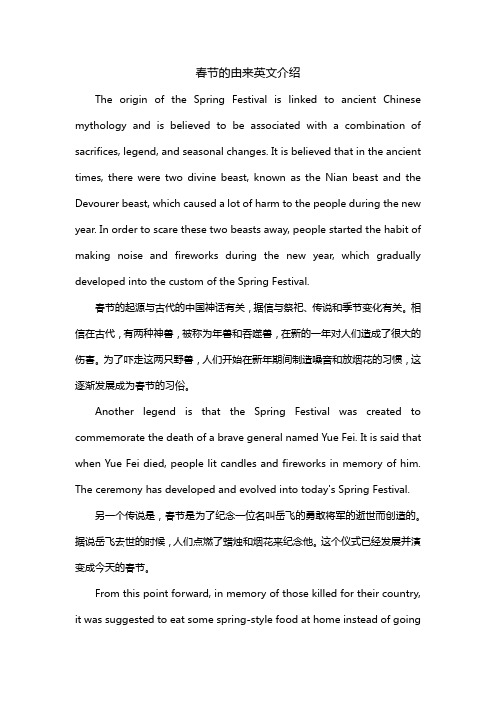
春节的由来英文介绍The origin of the Spring Festival is linked to ancient Chinese mythology and is believed to be associated with a combination of sacrifices, legend, and seasonal changes. It is believed that in the ancient times, there were two divine beast, known as the Nian beast and the Devourer beast, which caused a lot of harm to the people during the new year. In order to scare these two beasts away, people started the habit of making noise and fireworks during the new year, which gradually developed into the custom of the Spring Festival.春节的起源与古代的中国神话有关,据信与祭祀、传说和季节变化有关。
相信在古代,有两种神兽,被称为年兽和吞噬兽,在新的一年对人们造成了很大的伤害。
为了吓走这两只野兽,人们开始在新年期间制造噪音和放烟花的习惯,这逐渐发展成为春节的习俗。
Another legend is that the Spring Festival was created to commemorate the death of a brave general named Yue Fei. It is said that when Yue Fei died, people lit candles and fireworks in memory of him. The ceremony has developed and evolved into today's Spring Festival.另一个传说是,春节是为了纪念一位名叫岳飞的勇敢将军的逝世而创造的。
春节的由来 英文版
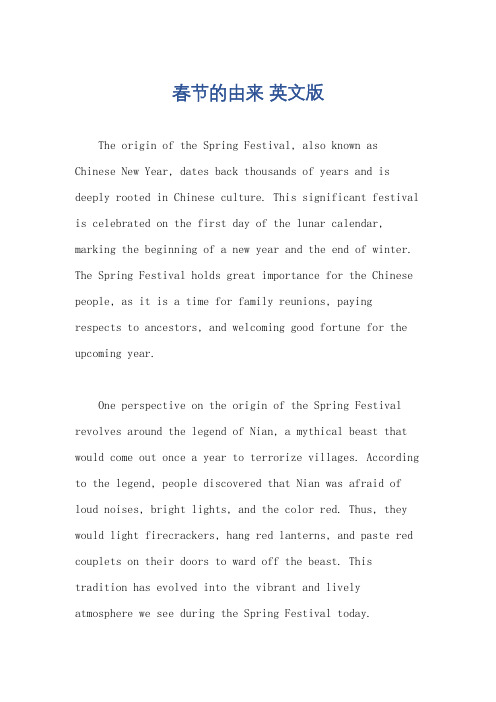
春节的由来英文版The origin of the Spring Festival, also known as Chinese New Year, dates back thousands of years and is deeply rooted in Chinese culture. This significant festival is celebrated on the first day of the lunar calendar, marking the beginning of a new year and the end of winter. The Spring Festival holds great importance for the Chinese people, as it is a time for family reunions, paying respects to ancestors, and welcoming good fortune for the upcoming year.One perspective on the origin of the Spring Festival revolves around the legend of Nian, a mythical beast that would come out once a year to terrorize villages. According to the legend, people discovered that Nian was afraid of loud noises, bright lights, and the color red. Thus, they would light firecrackers, hang red lanterns, and paste red couplets on their doors to ward off the beast. This tradition has evolved into the vibrant and lively atmosphere we see during the Spring Festival today.Another perspective focuses on the agricultural significance of the Spring Festival. In ancient times, the Chinese people were primarily farmers, and the arrival of spring marked the beginning of a new farming season. The festival served as an occasion to express gratitude for the harvest of the previous year and to pray for a prosperous year ahead. People would offer sacrifices to the gods of agriculture and pray for good weather and abundant crops. This agricultural aspect of the festival highlights the close connection between the Chinese people and the land they cultivate.The Spring Festival is also deeply rooted in Chinese mythology and folklore. One popular story is that of the Kitchen God, who is believed to watch over each household and report their behavior to the Jade Emperor. On the 23rd day of the twelfth lunar month, families would offer sacrifices to the Kitchen God, hoping for a favorable report. This tradition is accompanied by the belief that the Kitchen God's mouth must be sealed with sticky rice cake to prevent him from speaking ill of the family. Thisstory adds a mythical and spiritual element to the festival, emphasizing the importance of moral values and good behavior.In addition to its cultural and historical significance, the Spring Festival holds immense emotional value for the Chinese people. It is a time for family reunions, where people travel from all corners of the country to be together. The festival is often the only opportunity for many to see their loved ones, and the joy of being reunited after a long period of separation is immeasurable. The festive atmosphere is filled with laughter, warmth, and love, as families gather around the dining table to enjoy sumptuous meals and exchange blessings for the new year.Furthermore, the Spring Festival is a time forreflection and renewal. It is customary for people to clean their homes thoroughly before the festival, symbolizing the removal of any bad luck or negative energy accumulated over the past year. This act of cleaning not only bringsphysical cleanliness but also a sense of rejuvenation and hope for a fresh start. The festival also provides anopportunity for individuals to set new goals, make resolutions, and embark on personal growth journeys.Overall, the Spring Festival's origin is a tapestry woven with various perspectives, encompassing mythical legends, agricultural significance, cultural traditions, and emotional connections. It is a celebration that encapsulates the essence of Chinese culture and values, bringing together families, communities, and the entire nation in a joyous and harmonious atmosphere. The Spring Festival is not merely a holiday but a cultural phenomenon that continues to evolve and thrive, carrying the hopes, dreams, and aspirations of the Chinese people for a prosperous and auspicious year ahead.。
- 1、下载文档前请自行甄别文档内容的完整性,平台不提供额外的编辑、内容补充、找答案等附加服务。
- 2、"仅部分预览"的文档,不可在线预览部分如存在完整性等问题,可反馈申请退款(可完整预览的文档不适用该条件!)。
- 3、如文档侵犯您的权益,请联系客服反馈,我们会尽快为您处理(人工客服工作时间:9:00-18:30)。
春节的由来英文Origin of the Spring FestivalSpring Festival is the lunar Suishou, is also our ancient traditional festivals. Ancient-off "year" is not in the twelfth lunar month on the 29th or on the 30th, but in the "wax on", that later, "Laba." Southern and Northern Dynasties later, the "wax Festival" to the end of the year. To the Republican era, the switch to Gregorian calendar was only then that the lunar year is called "Spring Festival", because the Spring Festival is generally in the "Spring," both before and after.翻译:春节,是农历的岁首,也是我国古老的传统节日。
古代过“年”不是在腊月二十九日或三十日,而是在“蜡日”,即后来的“腊八”。
南北朝以后,把“蜡祭”移至岁末。
到了民国时,改用阳历,才把阴历年叫“春节”,因为春节一般都在“立春”前后。
Spring Festival is China's biggest and most exciting festival of an ancient tradition. Commonly known as "Chinese New Year." According to China's Lunar New Year, the first month who started in ancient times known Mongol Yuan Chen, Yuan-cheng, Yuan Shuo, New Year's Day and so on, commonly known as New Year's Day, as well as the previous day, moving in, three new moon, three North Korea, the three began, ternary, etc. Do not say, which means the first month who started this is the year, month, day three start.翻译:春节是我国最盛大、最热闹的一个古老传统节日。
俗称“过年”。
按照我国农历,正月初一古称元日、元辰、元正、元朔、元旦等,俗称年初一,还有上日、正朝、三朔、三朝、三始、三元等别称,意即正月初一是年、月、日三者的开始。
Chinese New Year, by definition is a spring festival. Spring, Vientiane update, a new round of sowing and harvesting season is beginning. People have every reason to dancing and singing to welcome the holiday. Thus, before the Spring Festival red paper pasted on the door face, yellow-word New Year's Message.翻译:春节,顾名思义就是春天的节日。
春天来临,万象更新,新一轮播种和收获季节又要开始。
人们有足够的理由载歌载舞来迎接这个节日。
于是,节前就在门脸上贴上红纸黄字的新年寄语。
The another name is called the Spring Festival Chinese New Year. "Year" what is it? Is a kind of bad luck for people's imagination in animals. "Year" the one. Trees pride had Baicao no life; "year" one "off" and, all things grow, flowers everywhere. "Year" How can the past? You need to use whip shelled, so have the custom of burning firecrackers. In 1993, the Beijing Municipal People's Government promulgated a law to ban fireworks, so that this continuity throughout the ages for centuries the custom of the past.翻译:春节的另一名称叫过年。
“年”是什么呢?是一种为人们带来坏运气的想象中的动物。
“年”一来。
树木凋蔽,百草不生;“年”一“过”,万物生长,鲜花遍地。
“年”如何才能过去呢?需用鞭炮轰,于是有了燃鞭炮的习俗。
1993年,北京市人民政府颁布了禁放烟花爆竹的法律,使这一沿续了几百年的习俗成为历史。
Spring Festival is a family reunion holiday, which is very similar to Christmas in the West. Away from home when the children returned to their parents at home to travel long distances. Real the night before Chinese New Year is called "New Year's Eve", also known as "Reunion Night", "group years." From the traditional New Year's Eve celebrations continued until the fifteenth day Lantern Festival. Festive atmosphere, to last a month. Holiday movies before Jizao, worship of ancestors, to eliminate contamination. To be posted on the 30th Door God, couplets, flag, eating dumplings, fireworks, New Year's Eve, "Shou Sui" and other ceremonies; younger generation who started their elders to pay the first month, and then to the New Year with relatives and friends. When he met friends and relatives for the first time,Say, "congratulated the new hi", "Kung Hei Fat Choi", "Congratulations," "Happy New Year" and then congratulated each other.翻译:春节是个亲人团聚的节日,这一点和西方的圣诞节很相似。
离家的孩子这时要不远千里回到父母家里。
真正过年的前一夜叫“除夕”,又叫“团圆夜”,“团年”。
传统的庆祝活动则从除夕一直持续到正月十五元宵节。
喜庆气氛要持续一个月。
正月初一前有祭灶、祭祖、扫除污秽。
三十日要贴门神、对联、挂旗、吃饺子、放鞭炮,除夕“守岁”等仪式;正月初一晚辈向长辈拜年,然后至亲友家贺年。
亲友第一次见面时,说些“恭贺新喜”、“恭喜发财”、“恭喜”、“过年好”等话,互相祝贺。
December 23, 1949, the PRC Central People's Government provides for an annual Lunar New Year holiday 3 days. Chinese New Year - China the public is most solemn, the most lively of an ancient traditional festivals.翻译:1949年12月23日,中华人民共和国中央人民政府规定每年春节放假3天。
春节——我国民间最隆重、最热闹的一个古老传统节日。
春节压岁钱的英文由来Lucky money春节拜年时,长辈要将事先准备好的压岁钱分给晚辈,据说压岁钱可以压住邪祟,因为“岁”与“祟”谐音,晚辈得到压岁钱就可以平平安安度过一岁。
Happy New Year Spring Festival, the elders will prepared New Year's money to the younger generation, it is said that the New Year's money can be pinned XieSui, because "old" and "are" harmonics, junior get lucky money can be spent a year in peace.压岁钱有两种,一种是以彩绳穿线编作龙形,置于床脚;The New Year's money has two, one is the color rope threading loin dragon, at the foot of the bed;另一种是最常见的,即由家长用红纸包裹分给孩子的钱。
